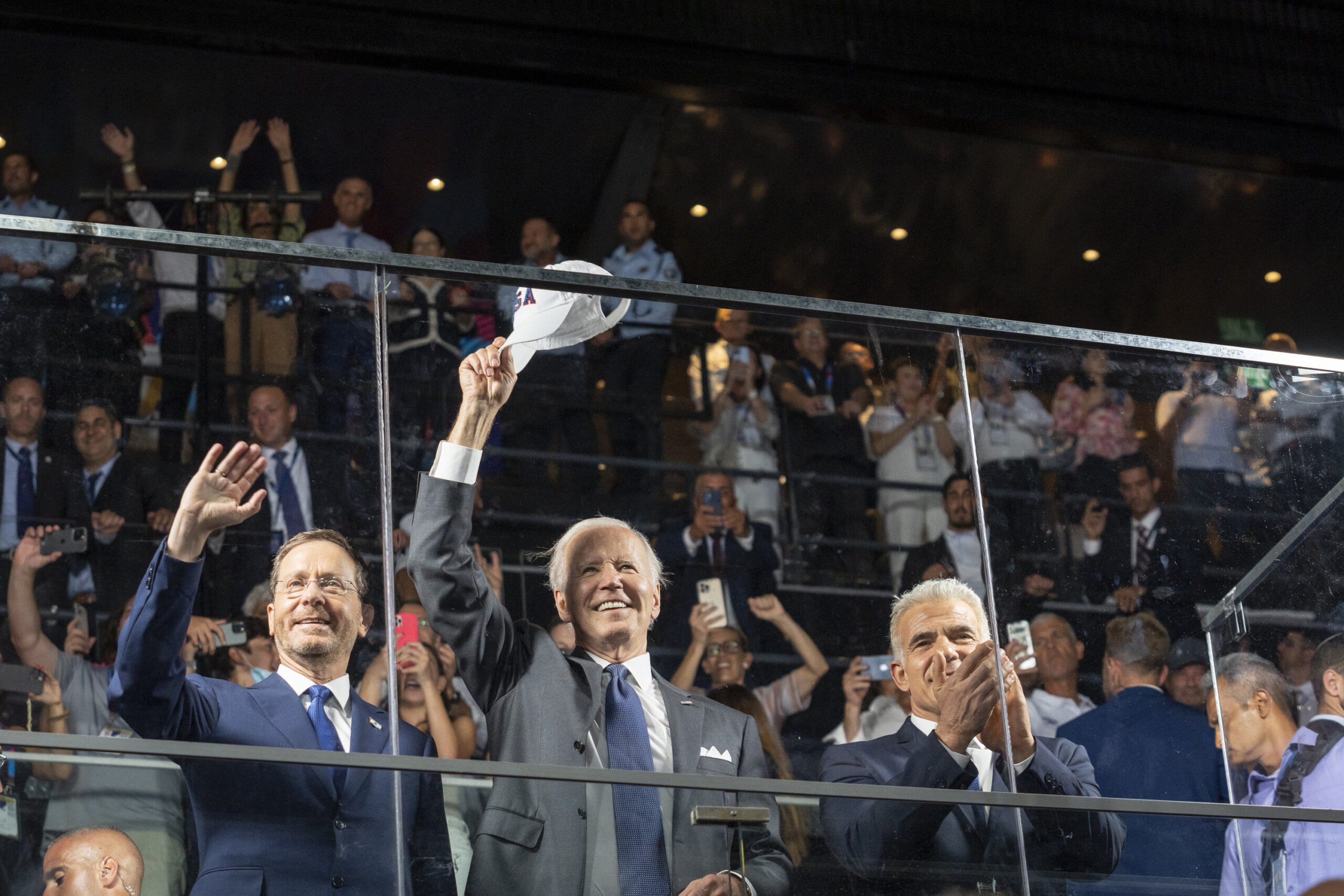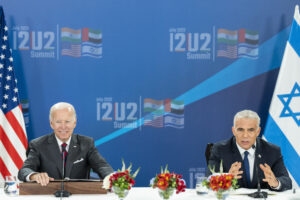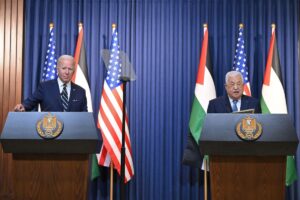
(The White House, 15.2022) — The following are remarks by US President Joe Biden made at an East Jerusalem Hospital network event.
THE PRESIDENT: My name is Joe Biden. I am Jill Biden’s husband. (Laughter.) She has been here twice before me.
And before I begin, I’d like to say that — there’s an old expression: “Hope springs eternal.”
I — my background and the background of my family is Irish American, and we have a long history of — not fundamentally unlike the Palestinian people with Great Britain and their attitude toward Irish-Catholics over the years, for 400 years.
But my colleagues, when I was a U.S. senator, used to always joke with me that I was always quoting Irish poets when I was on the floor of the Senate. And they thought I did it because I’m Irish. That’s not the reason I did it; I did it because they’re the best poets in the world. (Laughter.)
There’s a great poem from “The Cure at Troy” — a paragraph. It goes like this — and it’s classically Irish, but it also could fit Palestinians. It says:
“History [teaches us not to] hope
On this side of the grave.
But then, once in a lifetime
[That] longed-for tidal wave
Of justice [rises] up,
And hope and history rhyme.”
“Hope and history rhyme.” It is my prayer that we’re reaching one of those moments where hope and history rhyme.
I — are there any nurses in the room? Because if there are not, I’m going home. (Laughter.)
If there are any angels in Heaven — (laughter) — no, no, no, I mean this sincerely from the bottom of my heart. My wife and daughter were killed and my boys were trapped in a vehicle for three hours when a tractor trailer hit them. And doctors saved their lives, but the nurses made them want to live, and cared for them every day, and knew — knew when they were ready and when they weren’t ready.
I was making a speech and I had a terrible headac- — (coughs) — excuse me — a terrible headache. And — sorry — (takes a sip of water) — (coughs) — I swallowed wrong. I had a terrible headache. This was years ago. And I did a very stupid thing: I got on an aircraft and I flew home. It turned out I had two cranial aneurysms, and I got rushed to a hospital in the middle of a snowstorm for a nine-and-a-half-hour operation that saved my life.
Then I had the second operation; they found an aneurysm on the other side of my brain. I joke: The reason they went in twice to take the top of my head off is because they couldn’t find a brain the first time. (Laughter.)
And in between, I had a major embolism that almost killed me. Nothing unusual that other people haven’t gone through. But I look back on it, and I don’t think you nurses are nearly appreciated enough.
What I found was: You lie in the ICU — and I have not said this publicly before — and you look at the monitors, and you know if the line goes flat, you’re dead. You don’t know what each monitor is, but you know. And I really mean it — it’s true. But you just get tired. Even when you’re not in pain, you just want to quit.
And the nurses at Walter Reed Hospital would come up, they’d rub my face, they’d whisper in my ear. They’d get close and tell me, “It’s going to be okay.”
They made a difference in my life.
My son spent a year in Iraq. He was the attorney general of the state of Delaware. He should be the man standing here and talking to you as President, not me. He came home because he — his — where he slept for a year in Iraq was about 150 yards from a burn pit where they burned everything from fuel to garbage.
He went — the fittest guy in his regiment, in his outfit, and came home with stage four glioblastoma. I watched for 14 months the nurses take care of him — the doctors as well — but every day — every single day.
And so I really mean it from the bottom of my heart: Nurses — doctors are critical; I’m not in any way diminishing the role of a doctor. But nurses — nurses give you as much hope — male and female — as anybody else does.
I want to thank the CEO and everyone at East Jerusalem Hospital Network for welcoming me this morning. This is the first time I had the opportunity to see for myself the outstanding work that you do here, that I’ve heard about for such a long time.
My wife, Jill, visited in both 2010 and 2016, and I’m honored to be able to see firsthand the service and the quality of care you provide the Palestinian people.
These hospitals are the backbone of the Palestinian healthcare system. People turn to you in their moment of need, as you well know, with their children who are sick, with a loved one who’s injured.
When they get that cancer diagnosis — the most feared word, I think, in all languages is when the doctor looks at you and says, “It’s cancer.” They don’t know what to do.
You not only care for them, you guide them. It’s the same [for] people all over the world. In that moment, all that matters is that you’ve got someone that you can turn to and radiates hope and help.
That’s why the United States, through the Agency for International Development, has been so proud — has been proud to support this network of hospitals with $85 million since 2014. It’s part of our commitment to support health and dignity to the Palestinian people. Maybe the most overused phrase — word in the English language for the Irish is “dignity.”
My dad used to say, “Everyone, no matter what their circumstance, is entitled to be treated with dignity.” Dignity.
And dealing with the COVID-19 pandemic took a hard toll here, as it did in so many communities around the world. So, today, I’m pleased to announce the United States is committing an additional $100 million to support these hospitals, your staffs, and — that work for the Palestinian people.
This is a multiyear commitment in both resources and expertise. When I was Vice President, I asked the President, then Barack Obama — I asked him whether or not I could start what we called a Cancer Moonshot. I visited every major cancer hospital in the world, with one exception — and I mean it literally. Because there’s so much — so much we’re just on the edge of being able to discern. We’re so close, dealing with so many cancers.
When I got elected President, I announced that one of my goals was to change cancer as we know it so it was no longer viewed by many people, as it is, as a death sentence but as a disease that can either be cured or lived with.
**3
**12:30-end
And we started this Cancer Moonshot with billions of dollars at home.
Within our National Institute of Health, I set up a provision where, like within the Defense Department — there’s a special office in the Defense Department that’s nothing but looking at breaking technologies, whether it’s — just across the board. That’s where the Internet came from.
Well, we’re doing the same thing at the National Institute of Health, just focusing on cancer. Period. This one provision.
It represents our investment in the future. As your — this — hopefully, this $100 million will generate other large contributions from other countries, focusing on the health of the Palestinian people so they’ll continue to have access to the best available care, so they know they have somewhere to turn for help. They have navigators that can help them through the process.
Those of you who have been on the other side of a diagnosis know the most frightening thing is: When you get the word, whatever it is, you can hardly listen. You need a navigator. You need someone to help you walk through the pieces, help you figure out how to deal with the treatment you’re going to have once you’re out of the hospital and need treatment.
Working together, it is my prayer the United States will both help relieve the hospital’s burden of debt and support for targeted infrastructure upgrades and key reforms in patient care to ensure long-term financial stability.
We also welcome the $25 million contribution from the UAE, and I encourage other nations around the region and around the world to step up as well with their own contributions to support the vital work that’s being done here.
Palestinians and Israelis deserve equal measure of freedom, security, prosperity, and dignity. And access to healthcare when you need it is essential to living a life of dignity for all of us.
The United States will continue to work with the Palestinian leadership, with the government of Israel, and with all our international partners to ensure that East Jer- — East Jerusalem’s Hospital Network retains sustainable, remains available, and is able to provide high-quality care that the Palestinian people deserve.
I could say much more, but if my mother were here, she’d look at me and say, “Joey, hush up. You’ve spoken too long.”
But I want to thank you again for welcoming me — welcoming me today. Most importantly, thank you for taking care of all the patients — all the patients whose lives you make better.
May God bless you all. And I’m finished. Thank you. (Applause.)
AUDIENCE MEMBER: (Inaudible.)
THE PRESIDENT: If you have a question about hospitals —
AUDIENCE MEMBER: Yes.
THE PRESIDENT: — I’ll answer it; if you don’t, I’ll do it privately.
AUDIENCE MEMBER: Yeah. Okay. I am American Palestinian from New Jersey, Bergen County, and I vote for you. I am a head nurse of pediatric intensive care unit at Makassed Hospital. Thank you for your support, but we need more justice, more dignity. And thank you.
THE PRESIDENT: Thank you. Thank you, folks. Appreciate it very, very much. Thank you. (Applause.)
____________________

